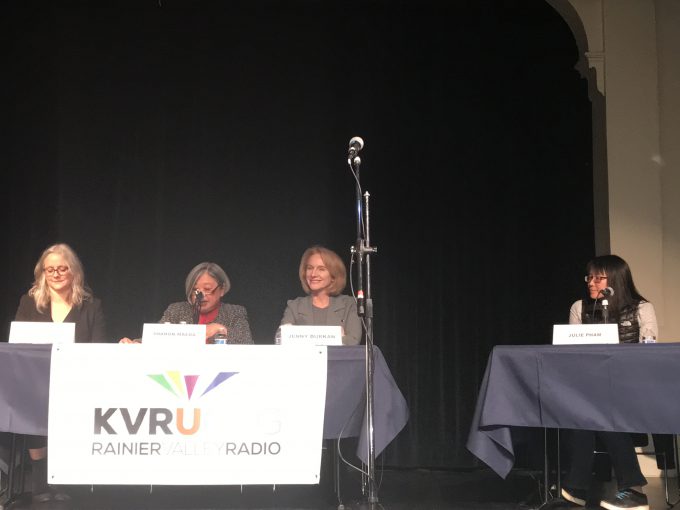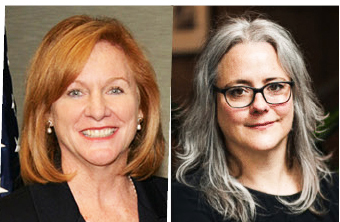Progressive Values Should be Inclusive and So Should Our Next Mayor
Most southenders did not vote for Cary Moon (right) or Jenny Durkan (left) in the primaries. You will play a big role in deciding Seattle’s next mayor. Each candidate would love to earn your vote.
I know a lot about candidates trying to get votes and endorsements. My parents started Northwest Vietnamese News Người Việt Tây Bắc in the Rainier Valley in 1986 and it’s been operating here ever since. During the dark years of the most recent recession, I managed the newspaper and brought together different ethnic media outlets in a coalition called Sea Beez. Although I now work at a nonprofit representing the tech industry, I still help organize an annual ethnic media candidates meet n greet so that different candidates can meet a wide range of ethnic media leaders at one event and start to understand how the communities represent different interests. Some candidates see this as an opportunity to “secure the POC vote.” So, they focus on how they will help disenfranchised communities of color and tell us what they think we want to hear. This tactic plays a strong role in this mayoral race.
The narrative of division
The biggest issues in this year’s election cycle stem from our recent economic boom. Our prosperity has also created huge disparities with the biggest impact being on communities of color, and made issues such as affordable housing and alleviating homelessness among the most pressing issues facing the mayoral office.
Because this area and the Central District have felt the impact of gentrification the most, both Moon and Durkan appeal to southenders by prioritizing helping those left behind. To differentiate the candidates, superficial binaries have emerged: “us” vs.”them,” the “Resistance” vs. the “Establishment,” change vs. “business as usual.”
As Moon positions herself as the more progressive of the two, Durkan was forced to defend the fact she has broad support – including that of the business community – which has been framed as a negative to a wide range of supporters and in direct conflict with the interests of communities of color. If I relied on this simple narrative, then I’d absolving myself of the responsibility to look really hard at the meaningful differences between Moon and Durkan in the context of determining who should be the next mayor of Seattle.
In examining both candidates’ backgrounds, Durkan is better qualified to execute on a vision of a more inclusive, not divided, Seattle.
Being “inclusive” is usually code for including underrepresented, low-income, communities of color. I define “inclusive” to mean including all stakeholders, such as small business owners who are being told they are exploiting their workers if they can’t keep up with ever-changing business regulations; big businesses who want to collaborate on and not just fund solutions to Seattle’s tough social problems; and newcomers who want to be part of Seattle, but are portrayed as a source of growing inequities.
With the debate focusing on Seattle’s skyrocketing housing costs and increasing homelessness, stories of new small businesses and young nonprofits who are thriving because of Seattle’s new wealth often get sidelined. I have friends who benefit from the low-income housing set aside in new developments, and others who now have great living-wage union jobs because of our growth. Those success stories should be included when we talk about today’s Seattle.
The real differences between Moon & Durkan
If I could wave a magic wand, Durkan would be elected mayor and Moon would be appointed as head of city planning. Moon has great ideas, some of which Durkan should examine and perhaps adopt, including allowing rezoning of areas currently zoned for single-family homes and legalizing homeless encampments.
But to be able to execute on an inclusive vision of Seattle, we need a mayor with a demonstrated ability to:
- Successfully champion policies in a multitude of issue areas.
- Bring together broad coalitions of stakeholders.
- Work with local, state, and federal lawmakers
While Moon has a long history of advocating for change as an urban planner and community volunteer, Durkan has actually made change happen over and over again as a U.S. Attorney who pushed for police reform, created a Civil Rights Unit, and developed the drug courts. Durkan’s expertise in cybersecurity is a huge asset as well.
Durkan understands including businesses as stakeholders doesn’t mean she’s beholden to them. In recent years, local candidates like Durkan face automatic criticism when they receive any support from large businesses and groups like the Seattle Chamber of Commerce’s PAC. Meanwhile, companies are now willing to support any candidate who will consider including them in the very policy discussions that often have a direct impact on their business. Indeed, many businesses to date have not been included in the many facets of city public policy discussions. This is despite an expressed desire by the council to create a forum to address homelessness. The business community has not had a real seat at the table.
It is important to also note that corporate donations do not necessarily correlate to close alignment with corporate interests. Look at Mayor Murray– despite corporate support during his own campaign, he admitted he couldn’t understand what the business community wanted.
On the issues, Durkan has proposed free community college tuition to Seattle high school grads, which will also function to provide a trained workforce for local businesses. This is a win-win solution for our local businesses, and for the graduates of our Seattle Public School system who will have a better opportunity to compete for the well-paid jobs in our region. Disclaimer: Durkan has expressed support for Apprenti, a registered apprenticeship that helps women, people of color, and veterans get high-paying tech jobs. Apprenti is a program of my employer.
We will have to collaborate with more than our business and education communities to tackle the challenges we face. While both Moon and Durkan understand that creating a city income tax will require a change in the state constitution, Durkan can more effectively advocate for such a change thanks to her deep relationships built over time with leaders in Olympia. To fight homelessness, she has proposed coordinating efforts with King County, which oversees mental health treatment. Lastly, Durkan is much better positioned to stand up to the Trump administration given her more complete understanding of the federal landscape.
A mayor who can make tough, unpopular decisions
At the October 18 KRVU mayoral debate, I posed the opening question: Could you share an example of when you had to handle a divisive issue and you reached out to communities who normally wouldn’t participate even when you knew that consensus was not going to be possible?
Durkan answered first. She cited her time as a U.S. Attorney working on police reform. She talked about launching investigations with the U.S. Department of Justice, doing outreach throughout the city, bringing interpreters and getting people to talk. At times, people were resistance to engaging with the Department of Justice there, so Durkan ensured she brought along credible messengers to build trust. They also talked to police department personnel, including line officers and command staff. “This was not just for talk or process but to get something done. The Consent Decree brought all those voices together,” Durkan concluded.
Moon said she’d share “a slightly sideways story but I think will get to the answer you’re looking for.” She reflected on her experience being part of the Progress Alliance, a donor alliance that invests in infrastructure for progressive causes led by, in Moon’s words, “wealthy white people.” She discussed how they arrogantly thought they had the right strategy but then how after they went through an “intense, long equity training, realized we were doing everything wrong.”
While I appreciated Moon’s humility, her answer assumed that I was looking for a certain answer that would illustrate her commitment to racial equity. I was not. I wanted a genuine example in including diverse voices, navigating conflict and making tough, unpopular decisions when the stakes are high because the mayor will have to do that often. Durkan has that experience; Moon does not.
I have been asked many times over the years to publicly endorse candidates. This is the first time I have ever felt compelled to so because the narrative of division in this year’s election is distracting.
The real difference between Moon and Durkan is their track record, not their values. My vote is to have a mayor who has the vision and experience to lead a Seattle that includes all voices.
Julie Pham
(post on South Seattle-Emerald)



